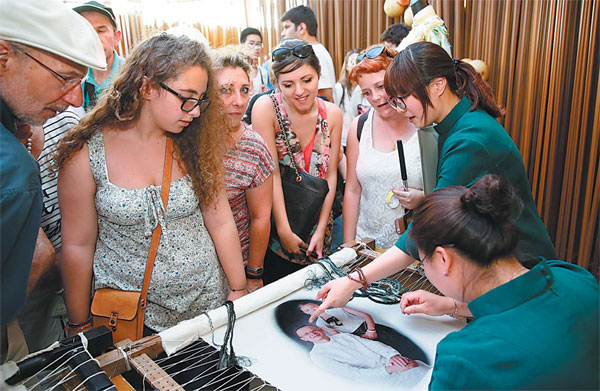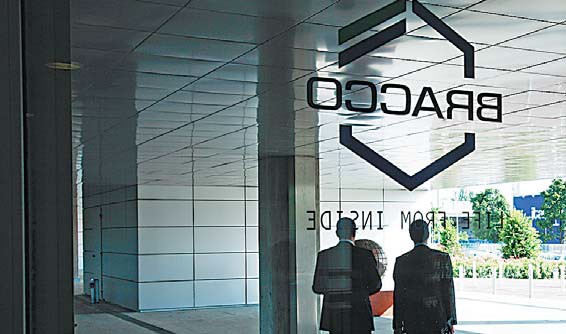Buongiorno Italia, hello China
Updated: 2015-06-19 06:55
By Cecily Liu(China Daily Europe)
|
|||||||||||
In fashion, culture and other fields, countries are waking up to opportunities each has to offer
As Italy and China continue to work together in many fields, businesses say there is much more potential for bilateral trade and investment.
Areas in which the countries work closely together include agricultural processes, education, fashion, financial services, food and tourism. Strong political ties between the two countries are also providing a strong foundation for business and cultural ties.
|
Chinese embroidery has attracted many visitors to the China Pavilion at the Milan Expo. Ye Pingfan / Xinhua |
"The Milan Expo is also providing a good opportunity to deepen bilateral exchanges because many Chinese and Italian businesses have been able to discuss business cooperation in a series of themed conferences held during the expo."
In the fashion industry, Milan's haute couture shopping district of Via Monte Napoleone has teamed up with Shanghai's shopping street, Nanjing Road, to help its retail stores improve their branding.
In the field of technology, the Chinese telecommunications firm Huawei has a strong presence in Italy, providing telecommunications networks and technology to Italian operators, including Vodafone and Telecom Italia.
Huawei is also providing internal communications services to many Italian companies, including Poste Italiane and Trenitalia. Its smartphones are also popular in Italian retail stores.
It now employs more than 650 people in the country, and Italy is one of the top three revenue earning countries for Huawei Europe.
Edward Chan, chief executive of Huawei Italy, says the country is a highly competitive market and that Huawei has had to work hard to gain customer trust. The company first dealt with this challenge by investing in local people, he says.
"We benefit from a significant local workforce and we operate worldwide to eliminate any cultural differences."
Innovation is also important to the company, he says. "We innovate based on customer needs."
Huawei has opened four innovation centers in Italy with its carrier customers.
"Ultimately, the key to creating the right deals is to focus on situations in which all parties benefit and where the commitment from the parties is long term," Chan says.
Italy is a good environment for Huawei to make strategic investments because of its highly skilled workforce, a strong and rich history of engineering and innovation and a legal system that both respects and protects intellectual property, he says.
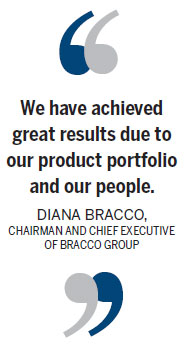
The conglomerate Hengdian, whose headquarters are in Zhejiang province, is another Chinese company that has set up a presence in Italy, looking for potential opportunities in Europe to invest mainly in companies in the electronics, entertainment, fashion and pharmaceuticals.
Hengdian, which is 40 years old, is a conglomerate active in many fields, one of the best-known being movie production.
Airaldo Piva, managing director of Hengdian Europe, says the company is looking for European partners with niche-sector technology but in need of capital. Hengdian wants to invest in them financially and help them enter the Chinese market.
Piva helped Hengdian set up its European headquarters in Milan in 2006 and has built up a team of four. As a European managing director of a Chinese company, Piva says trust with his Chinese boss and colleagues is the most important ingredient to success.
Hengdian is in the process of discussing two co-productions with European companies. Piva says both films can be partly filmed in China to make good use of Hengdian's studios and filming resources, and the movies could be released in China and in Europe.
In 2010, the two countries set up the China-Italy Technology Transfer Center to promote matchmaking between Chinese and Italian science parks and high-tech companies, and accelerate bilateral technology transfer and innovation collaboration.
The center has partnerships with many Italian and Chinese universities and science parks, and has held many themed events to help businesses of both countries to meet each other.
Collaboration in medicine is also strong, and in 2006 the Euro China Society for Health Research was established to help Chinese medical industry experts come to Italy to receive education.
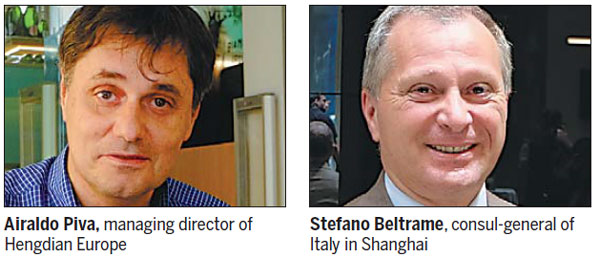
"We have helped train many Chinese medical practitioners by finding courses that suit their needs and time schedule," says the society's director, Sun Lei.
In medical research, the Chinese genomics organization BGI is making great inroads to partner with Italian universities and hospitals for genetics research. BGI has set up research partnerships with many Italian universities and hospitals.
Yu Cong, chief operating officer of BGI Europe, says its work in Italy is to partner with European institutes and use genomics tools to better understand illnesses relating to genetics and provide the best possible treatment for patients.
BGI was founded in 1999 in Beijing as a non-governmental independent research institute to participate in the Human Genome Project as China's representative.
BGI has grown significantly, and in 2010, BGI Europe was founded in Denmark. In 2011, BGI Europe set up a research laboratory in Copenhagen with the goal of partnering with European researchers in the fields of biological research, molecular breeding, healthcare and related fields, in all of which genetic analysis is important. Much of the research by BGI in Copenhagen is carried out for its clients in Europe.
BGI's key advantages in Europe are its extensive experience, abundant data, and advanced research equipment, Yu says.
"When we first entered Europe we had an open mind and were willing to share the results of our tests with our European partners, and this has allowed us to take on many projects, leading to a good database that we can now use to do better tests."
Italy is very important for BGI, Yu says, and his team is now in the process of discussing a possible partnership related to healthcare.
"The Italian healthcare system takes the needs of patients very seriously and has very good provision for its residents. We at BGI share the same value, and we hope to use our genetic analysis capability to help them better understand certain illnesses and implement the precision treatment."
In China, the Italian pharmaceutical firm Bracco Group has a foothold, one it established in 2001 when it formed a joint venture, Bracco Sine, with a Chinese pharmaceuticals concern.
Since then, Bracco Sine has grown rapidly. It employs about 300 people and has a factory in the Pudong district of Shanghai that was developed with Italian technology and expertise.
The factory produces diagnostic imaging contrast agents for X-rays, computed tomography, magnetic resonance imaging and ultrasound.
"Our growth in China has also pushed new investments in the production plant to adjust production capacity to the increased domestic demand," says Diana Bracco, group chairman and chief executive.
"We have achieved great results due to our product portfolio and our people, and also to the fact that Bracco has built strong relationships over the years with the scientific community, academics and Chinese hospitals."
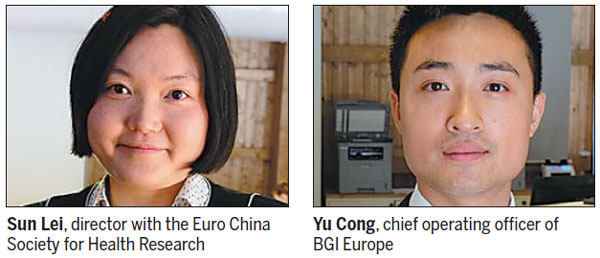
In education, Chinese students are increasingly studying at Italian educational institutions, and an increasing number of Italian universities are hosting Confucius Institutes, which are established by the Chinese government to help Western students learn Chinese.
"There is a lot of collaboration in the education sector, and I hope that it will increase in the future," says Giovanni Azzone, rector of the Polytechnic University of Milan.
The university started working with China about 10 years ago and has partnerships with the University of Tsinghua and Xi'an Jiaotong University for student exchanges, he says.
About 1,000 Chinese students study at the Polytechnic University of Milan, and five years ago it established a Confucius Institute.
"Chinese students contribute very much to our university," Azzone says. "On the one hand, they create an international climate in the university so others are aware of the way of thinking of Chinese culture. On the other hand, they are getting in touch with Italian companies and helping these companies to understand how to be in touch with Chinese companies and markets."
The increasing amount of collaboration between Italy and China has led to growing opportunities for service industry firms that can serve both markets, including banks, law firms and events organizers.
Italy and China also have many opportunities to collaborate in the cultural field, says Zhang Xian, conductor of the Milan Symphony Orchestra Giuseppe Verdi.
"In Italy, people are keen to learn more about Chinese culture. Italy has an inclusive culture and when Italians come into contact with Chinese music and art, they are immediately drawn to it."
Zhang, who hails from Dandong, Liaoning province, became the conductor of the orchestra in 2009, and in so doing became the first woman to be the music director of an Italian symphony orchestra.
She is proud the orchestra was able to give a small performance at the China Pavilion during Milan Expo, performing both Chinese and Italian songs, she says.
"The Milan Expo has really pushed forward cultural exchanges between China and Italy, because China has brought to Italy many of its own cultural elements, and helps Italians to understand China better."
cecily.liu@chinadaily.com.cn
|
The Italian pharmaceutical firm Bracco Group formed a joint venture with a Chinese pharmaceuticals concern. Provided to China Daily |
(China Daily European Weekly 06/19/2015 page12)
Today's Top News
Visa process for Chinese traveling through Europe streamlined
Grexit risk hikes
The most costly cities for expats
China, Russia sign railway deal
No mistreatment of GSK sleuth: Govt
Lies and false hopes entrap Xinjiangers
EU seeks to ban animal cloning
HK lawmakers reject election reform proposal
Hot Topics
Lunar probe , China growth forecasts, Emission rules get tougher, China seen through 'colored lens', International board,
Editor's Picks

|

|

|

|

|

|
